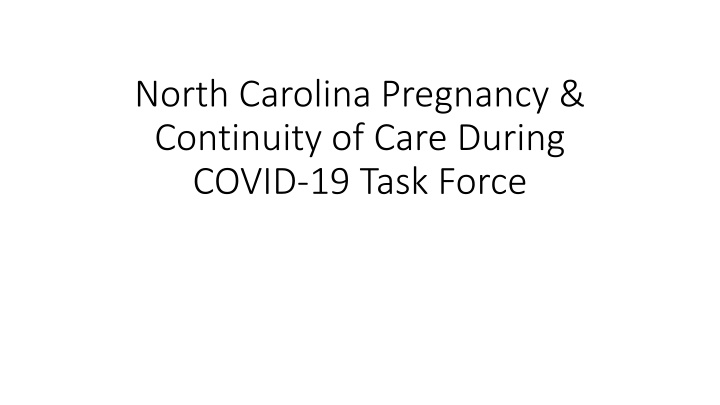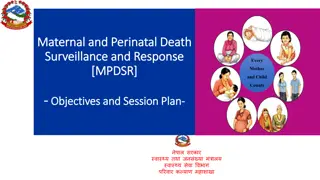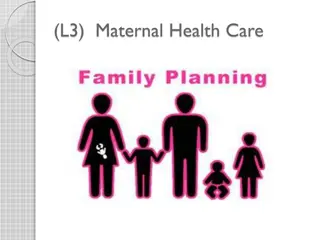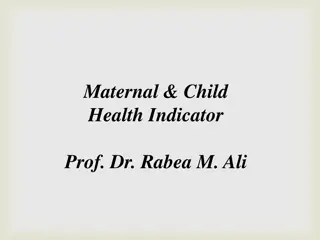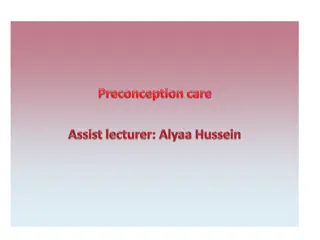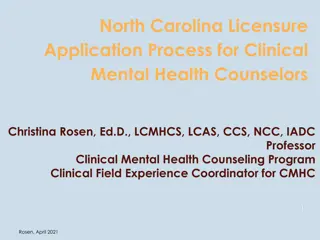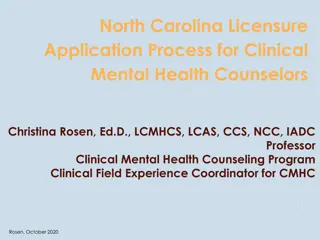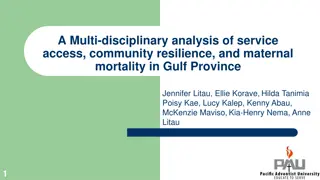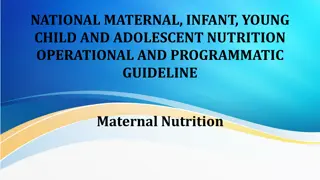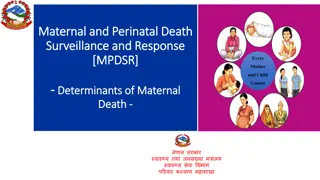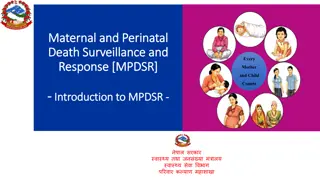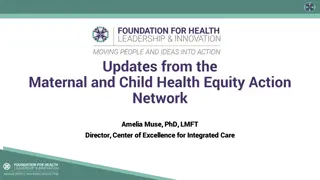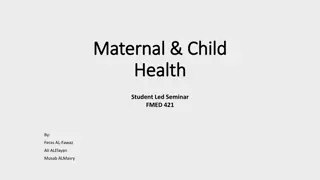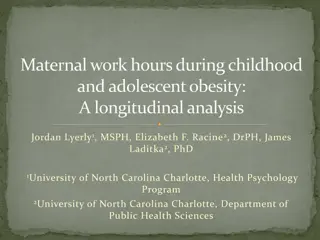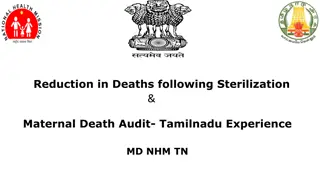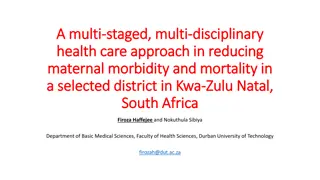Enhancing Maternal Care in North Carolina Amid COVID-19
The North Carolina Pregnancy & Continuity of Care During COVID-19 Task Force emphasizes health equity, equitable access to quality care, and safe patient-centered birthing options. Addressing factors such as employment, housing, and education is crucial in supporting pregnant individuals during and beyond the pandemic. Initiatives to improve access to care, ensure comprehensive coverage, and provide safe birthing environments are essential for supporting maternal health in North Carolina.
Download Presentation

Please find below an Image/Link to download the presentation.
The content on the website is provided AS IS for your information and personal use only. It may not be sold, licensed, or shared on other websites without obtaining consent from the author.If you encounter any issues during the download, it is possible that the publisher has removed the file from their server.
You are allowed to download the files provided on this website for personal or commercial use, subject to the condition that they are used lawfully. All files are the property of their respective owners.
The content on the website is provided AS IS for your information and personal use only. It may not be sold, licensed, or shared on other websites without obtaining consent from the author.
E N D
Presentation Transcript
North Carolina Pregnancy & Continuity of Care During COVID-19 Task Force
Health Equity Health equity means everyone has the opportunity to attain their highest level of health and well- being. Factors that influence health, such as employment, housing, education, native language, health care, public safety and food access must be addressed to help pregnant individuals during COVID-19 and beyond Health equity will not be achieved during the pandemic, it is critical that black, brown, indigenous, and rural communities are engaged as policies are being considered so as to not further deepen the disparities and to address the root causes of existing inequities. COVID-19 data on affected communities with respect to race/ethnicity and specific pregnancy- related impacts including infant feeding should be collected and continued to be released. Ensure community participation in all statewide workgroups related to maternity care, including the Maternal Mortality Review Committee, Maternal Health Innovations Task Force, etc.
Equitable Access to Quality Care and Protection of Human Rights in Childbirth Support current models of care that allow patients to access their healthcare needs simply and without barriers. Encourage development of new or hybrid models of care that incorporate access to telehealth and virtual visits which can expand access to people in North Carolina who need care. Recognize that telehealth may not be available in some communities and additional solutions will need to be found to ensure continued care. Assure that care is comprehensive and continuous. Access has been improved by Medicaid extension beyond the 60 day time frame from delivery. Medicaid coverage should be provided to all uninsured pregnant individuals by eliminating current restrictions. Coverage should continue for the first year after delivery as a permanent policy after the emergency.
Safe and Patient-Centered Birthing Options Increase individuals' understanding of different levels of maternity care and types of birthing facilities as well as how to work with providers to select the appropriate patient-centered birthing environment. Demonstrate safe and family-centered approaches in all settings. Support the work of free-standing birth centers as vital safe options for out-of-hospital births and lactation support: Continue access to personal protective equipment Support increased staffing as needed The presence of credentialed providers and support team is the foundation for safe birth within a system that allows for consultation, collaboration and transportation to higher levels of care. Trained doulas, lactation support persons, and mental health providers - in all settings (hospital, community) are essential and supported to provide care across settings along with access to personal protective equipment. Emphasize the importance of COVID-19 testing prior to labor or planned admission for pregnant individuals. Rapid COVID-19 testing on admission to labor and delivery may also be available. During the active second stage of labor, the pregnant individual will not be required to wear a mask, if COVID-19 negative. There will be appropriate personal protective equipment available for hospital staff and support people present.
Support Persons Birthing individuals should have access to at least one support person for the duration of their stay in the birthing facility and postpartum unit and a trained doula to support them during labor, delivery, and after birth. Trained doulas are considered an essential part of the maternity care team and should be allowed to accompany a pregnant person during labor and birth as an additional support person, as long as the pregnant person s medical condition allows. Their inclusion should be supported and not limited. Doulas should consider the changing landscape of the pandemic as they prepare their client for birth including access to personal protective equipment, a birth plan that discusses shared decision making, and while nothing takes the place of in- person support, preparation for virtual services if necessary. Lactation support and mental health support are also recommended as essential care for birthing individuals with confirmed COVID-19, particularly those who are not well enough to room-in with their infants or whose infants must be separated. These care providers should also be considered essential and supported in all maternity and neonatal care settings.
Fourth Trimester and Newborn Care The care of pregnant individuals and families does not end with the birth of their child. Access to healthcare and related services, equity in attaining care and wellness of the family must be supported. Initial new family care would incorporate shared decision making and education regarding benefits and risks of rooming in for asymptomatic COVID-19 positive parents. Accomodations to ensure that all families have access to translation and interpretation services as needed. Develop protocols for the appropriate use of telehealth evaluations for lactation, early and comprehensive postpartum visits. Ensure that all postpartum patients have access to required technology and devices to access telehealth services. Recognize that not all families have access to telehealth. Accomodations and innovations in communication to ensure that all families receive appropriate care need to be made. Postpartum, pediatric and lactation care after discharge should incorporate shared decision making and education regarding attendance of in-person clinic-based care with appropriate use of personal protective equipment for well families versus telehealth. Implementing newborn well child checks in devoted time blocks for well only visits in the clinical setting Telehealth follow up for mental/behavioral health supported by appropriate private and public health insurers Ensure seamless access to desired contraceptive methods to achieve desired reproductive life goals.
Education Through Partnerships Given the nature of this novel virus, there is emerging information about the effects of COVID-19 on pregnancy and the newborn. In order for patients, families, providers and the community to make informed decisions based on the best available science, it is crucial that there are resources to share the best knowledge we have on the topics of need and that these resources are culturally and linguistically appropriate and accessible. Recognize and share with the community that information and recommendations change frequently which can be challenging. There have been communication breakdowns between federal and state associations, institution to institution, and from provider to patient. Ultimately, a loss of clear and consistent communication trickling down to pregnant individuals and their families, exacerbating real fears. Acknowledgement for the need for information to flow from providers to families and back with the help and support of doulas, lactation consultants, childbirth educators, media and additional resources. Invest in the development of communications tools, platforms, and strategies to ensure that the most current scientific knowledge and clinical guidance are effectively conveyed to all stakeholders. Ensure that pregnant individuals and their families have access to evidence-based/informed childbirth education to prepare them to participate in shared decision-making with their providers.
